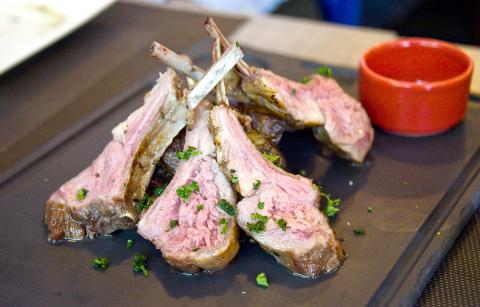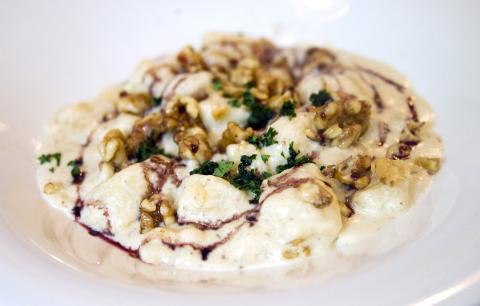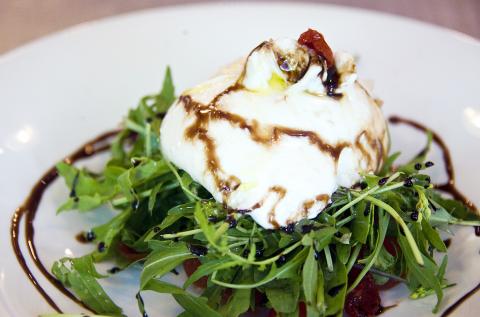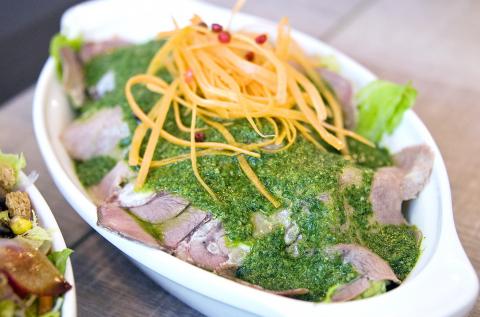I am not a fan of lamb dishes, mostly because they are so hit-and-miss. If you take the soft and tender approach by roasting it, it often remains too raw inside and at times carries a gamey aftertaste that lingers uncomfortably in your mouth for hours. On the flip side is overcooked dry meat, which is just depressing and even gamier.
But my mother had been raving about La Piola Cucina Italiana’s agnello scottadito — slow cooked New Zealand lamb rack — pretty much since it opened in July of last year, and I finally decide to give it a try.
We try reserving Sunday lunch for a few weeks, but the place is always booked. However, on this particular Sunday, we are the only customers. The young and amiable Brazilian-Italian head chef Enrico comes to our table and introduces himself, and seems to be on friendly terms with many of the customers who walk in later.

Photo: Han Cheung, Taipei Times
Enrico says he comes from Rome, but the restaurant specializes in cuisine from the Piedmont region in Northwestern Italy — which are marked on the menu with “D.O.C.” — Italian for controlled designation of origin.
If you like multi-layered flavors and food that practically melts in your mouth, that is what La Piola is all about — from the lingua al verde (beef tongue salad with bagnetto, a Piedmontese basil sauce, NT$480) to the lamb (NT$880).
Tongue usually leans toward the chewier, even rubbery, side — but here it is slow-cooked so it dissolves right away, not unlike pate, but retains the savory beef overtones. The vinegar, bagnetto and olive oil plus the saltiness of the meat work together perfectly, making for a simple dish with very complex flavors.

Photo: Han Cheung, Taipei Times
The burrata (NT$460) cheese appetizer is simply refreshing. Served chilled, the cheese falls somewhere between fresh mozzarella and cream, and has a tangy kick that dances on your tongue while you soak in the richness as it, again, melts in your mouth. The combination of fresh and dried tomatoes highlights the sweetness and sourness of the cheese and vinegar, and provides variety in texture.
For one of the main courses, we ordered the plin al burro salvia parmigiano (NT$450), a Piedmontese stuffed pasta in butter, sage and Parmigiano cheese. The pasta resembles mini raviolis, stuffed with a mixture of finely ground pork and beef — and as a result, each bite tastes a bit different depending on the ratio of the type of meat. It is so finely ground that I almost mistook the stuffing for melted cheese — which pairs well with the sharp Parmigiano on top.
The gnocchi alla Bava (NT$550) comes in a sharp four-cheese sauce balanced out with sweet red wine vinegar and walnuts. It also melts in your mouth — but gnocchi is an example where some degree of chewiness would actually be better, as it comes off as a bit mushy.

Photo: Han Cheung, Taipei Times
Finally, the long-awaited lamb. My mother is right — there is no gamey aftertaste, or whatever left of it is muffled by the peppercorn mustard. The meat is tender and came right off the bone. Enrico tells us he prepares it using the “sous vide” method, which involves sealing the meat in an air-tight plastic bag and slow-cooking it for hours in a 57-degree water bath.
This allows the meat to be evenly cooked for a long time, and retains the juices, aroma and spices while avoiding over or undercooking. When the time is ready, Enrico takes the meat out and sears it just enough for just the outermost layer of meat to become well-done. No wonder it is so consistent.
After we pay, Enrico comes to say goodbye and even walks us out the door.

Photo: Han Cheung, Taipei Times
I try hard to channel my worst inner cynic, but sometimes you just have to accept the fact that there really was nothing to complain about.

On April 26, The Lancet published a letter from two doctors at Taichung-based China Medical University Hospital (CMUH) warning that “Taiwan’s Health Care System is on the Brink of Collapse.” The authors said that “Years of policy inaction and mismanagement of resources have led to the National Health Insurance system operating under unsustainable conditions.” The pushback was immediate. Errors in the paper were quickly identified and publicized, to discredit the authors (the hospital apologized). CNA reported that CMUH said the letter described Taiwan in 2021 as having 62 nurses per 10,000 people, when the correct number was 78 nurses per 10,000

As we live longer, our risk of cognitive impairment is increasing. How can we delay the onset of symptoms? Do we have to give up every indulgence or can small changes make a difference? We asked neurologists for tips on how to keep our brains healthy for life. TAKE CARE OF YOUR HEALTH “All of the sensible things that apply to bodily health apply to brain health,” says Suzanne O’Sullivan, a consultant in neurology at the National Hospital for Neurology and Neurosurgery in London, and the author of The Age of Diagnosis. “When you’re 20, you can get away with absolute

May 5 to May 11 What started out as friction between Taiwanese students at Taichung First High School and a Japanese head cook escalated dramatically over the first two weeks of May 1927. It began on April 30 when the cook’s wife knew that lotus starch used in that night’s dinner had rat feces in it, but failed to inform staff until the meal was already prepared. The students believed that her silence was intentional, and filed a complaint. The school’s Japanese administrators sided with the cook’s family, dismissing the students as troublemakers and clamping down on their freedoms — with

As Donald Trump’s executive order in March led to the shuttering of Voice of America (VOA) — the global broadcaster whose roots date back to the fight against Nazi propaganda — he quickly attracted support from figures not used to aligning themselves with any US administration. Trump had ordered the US Agency for Global Media, the federal agency that funds VOA and other groups promoting independent journalism overseas, to be “eliminated to the maximum extent consistent with applicable law.” The decision suddenly halted programming in 49 languages to more than 425 million people. In Moscow, Margarita Simonyan, the hardline editor-in-chief of the